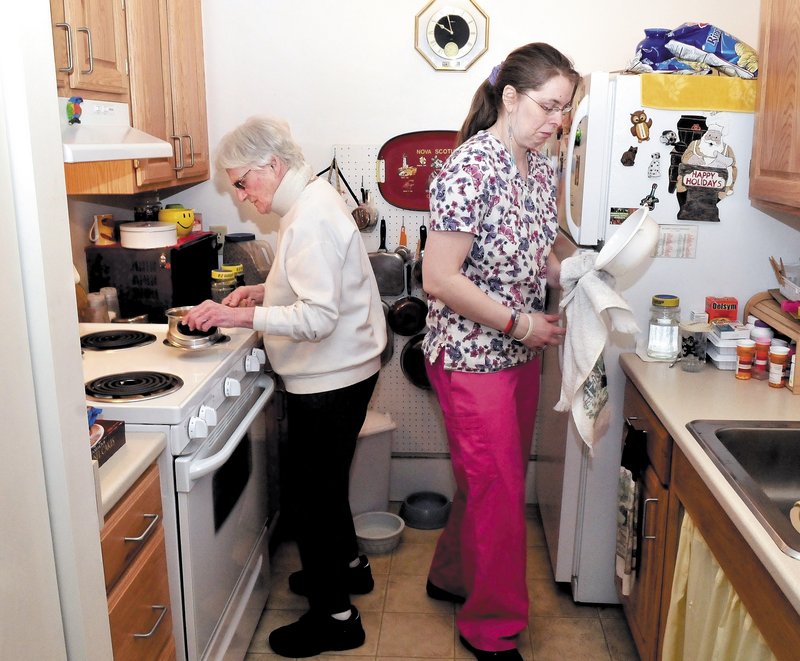Across-the-board sequestration cuts to federal programs mean the Meals on Wheels program is unable to deliver meals to some area seniors, leaving them struggling to feed themselves.
Program administrators have responded to the budget reduction by creating a waiting list for seniors in need and reducing the number of visits to the people it does serve. When the sequester took effect on March 1, federal programs were forced to cut $85 billion from their annual budgets.
Meals on Wheels is one of several programs funded under the Older Americans Act, which was included in the sequester cuts, according to Debra Silva, a vice president at Spectrum Generations, central Maine’s agency on aging.
Cuts to the Older Americans Act have a disproportionate effect in Maine, which in 2010 had the third-highest percentage of seniors in the nation, at 15.6 percent, according to the U.S. Census Bureau.
Silva said Spectrum lost $106,000, or 5 percent, of its budget because of sequestration. Because the cuts were retroactive to the beginning of the year, she said, the actual effect is 9 percent of the program’s services.
In response, Spectrum has reduced its offerings, which include community dining at Waterville’s Muskie Center and support services for family caregivers. It also provides educational outreach on health insurance, heating costs and fraud. Wellness classes, which teach seniors things such as how to manage chronic diseases, also are being cut back.
The loss of services has been apparent in the Meals on Wheels program. For the past 40 years, the program has delivered meals to seniors in need twice a week. Each volunteer visit includes a hot meal and one or two frozen meals, so that a senior winds up with five meals per week. The Muskie Center delivers about 200 meals a day to seniors.
In her 16 years at the Muskie Center, Silva said, the Meals on Wheels program never has had to turn people away because it couldn’t afford to feed them.
All that changed March 1, when the program began putting seniors on a waiting list for services.
The change came at a bad time for Marie Rouleau, 84, a Waterville resident who recently suffered a neck injury that makes it difficult for her to feed herself.
“I live alone,” said Rouleau, who has never married. “I don’t have any family.”
Despite her injury, for which she wears a soft brace, she can get up and get around without any problem, but the slightest movement hurts.
Her doctors tell her that the neck will never heal, she said.
Care workers do come to her house regularly, and take her to the grocery store once a week, but mostly she sits and watches TV, although even that is painful, she said.
As for feeding herself, she no longer can lift a heavy roast or a chicken out of the low oven, or wash and cut vegetables. Lately, she said, “I’ve been living on sandwiches and TV dinners. I eat a lot of soup.”
Rouleau had been a Meals on Wheels recipient previously, and now the time to accept help had come again, Rouleau decided in early March.
However, when she called, she said, she learned that the program had stopped accepting new clients just a few days earlier. She became one of the first people in the area to be put on a waiting list that has grown to 25 people in just a few weeks.
Silva said Rouleau is an example of a new group of seniors throughout the area who are finding themselves bereft of both the nutrition and the human contact that twice-weekly Meals on Wheels visits provide.
However, “We have to stop adding more meals, because we don’t have enough money,” Silva said.
Even those seniors who continue to receive the service will feel the pinch, she said, because beginning Monday, the service is scaling back from two visits per week to just one, in which the volunteer will deliver one hot meal and four frozen ones.
Silva said the change will save money because the program reimburses volunteers for their mileage costs. Still, she said, for many homebound seniors, the volunteer visit amounts to a safety check that is as important as the food being delivered.
“It’s hard for us to have to give up one of those visits,” she said. “We understand we have no choice, so we’re trying to do the best we can,” Silva said.
The ironic thing, Silva said, is that cutting these services actually costs taxpayers more money in the long term, because a tax dollar spent providing support services to someone at home can prevent having to spend many tax dollars on providing full-time care to the same person in a nursing home or an assisted-living facility.
Matt Hongoltz-Hetling can be reached at 861-9287 ot at:
mhhetling@centralmaine.com
Copy the Story Link
Send questions/comments to the editors.



Success. Please wait for the page to reload. If the page does not reload within 5 seconds, please refresh the page.
Enter your email and password to access comments.
Hi, to comment on stories you must . This profile is in addition to your subscription and website login.
Already have a commenting profile? .
Invalid username/password.
Please check your email to confirm and complete your registration.
Only subscribers are eligible to post comments. Please subscribe or login first for digital access. Here’s why.
Use the form below to reset your password. When you've submitted your account email, we will send an email with a reset code.